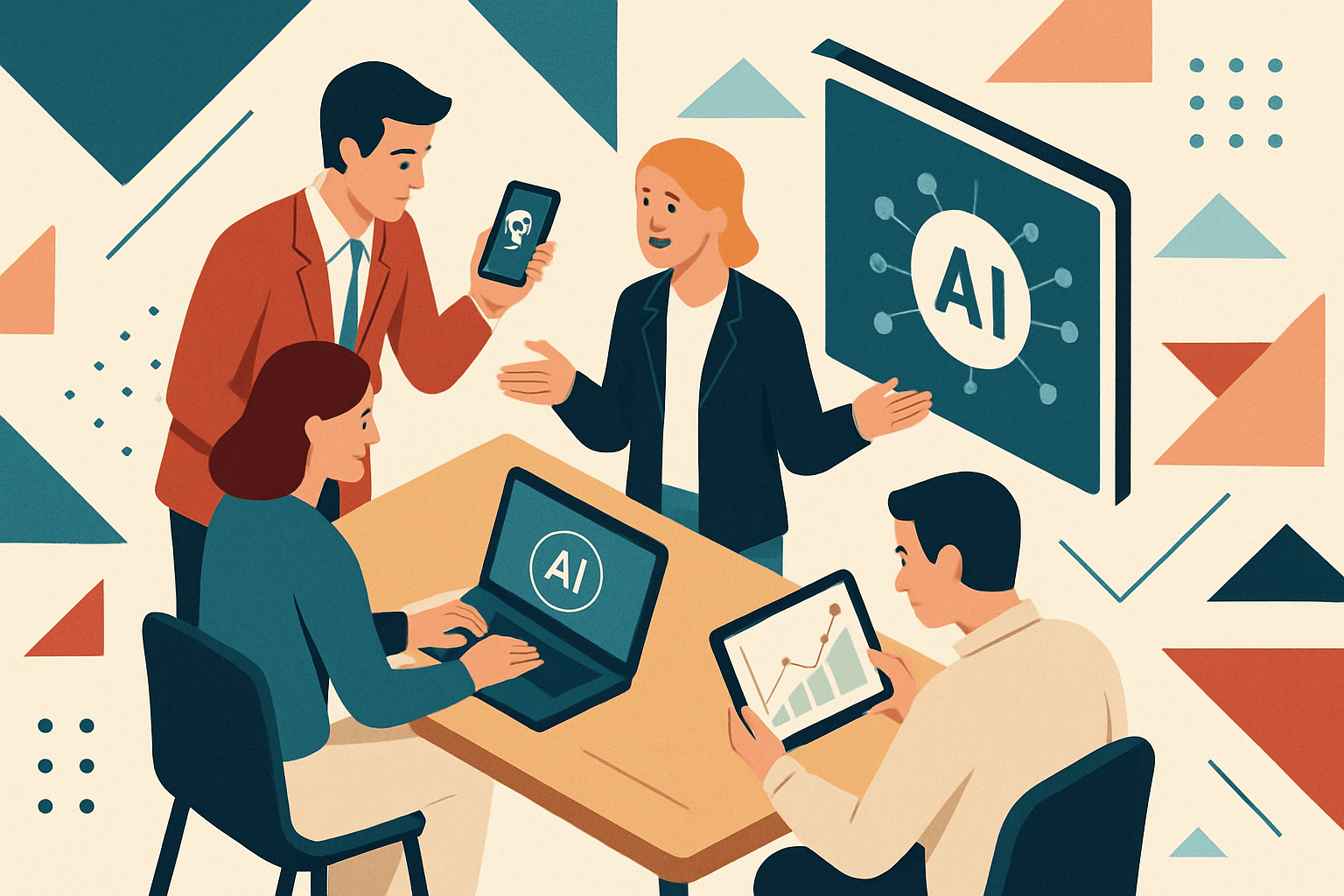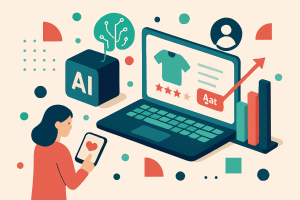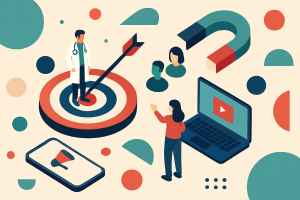
Preparing Knowledge Workers for an AI Future: Strategies and Insights
Empower Knowledge Workers for an AI-Powered Future
Equipping teams with AI skills for success in the evolving workplace.
Understanding the AI-Powered Future
The integration of AI technologies into the workplace is transforming how knowledge workers operate. As this trend accelerates, understanding the implications is crucial. The future of work is here, and it hinges on knowledge workers adapting to new tools and processes driven by AI. By embracing this change, businesses can ensure that their teams remain competitive and efficient.
What is a knowledge worker, you may ask? A knowledge worker is a person whose main capital is their knowledge, acquired through formal training and experience, which they apply to creative problem-solving, critical thinking, and decision-making. Unlike manual laborers, they use their intellect to analyze information, develop strategies, and create new products or services in fields like technology, finance, healthcare, and education.
AI in the workplace is not merely a buzzword. It represents a seismic shift in job roles, workflows, and overall business strategy. Knowledge workers must grasp how AI can augment their abilities rather than replace them. This understanding is essential to harnessing AI’s power effectively, demonstrating its capacity to streamline processes and enhance creativity.
To thrive in an AI-powered future, businesses need to cultivate a culture of continuous learning. This involves energy and commitment from leadership and the workforce alike. By fostering a mindset of adaptability and curiosity, organizations can prepare their knowledge workers for a landscape that will continuously evolve.
Identifying Key Skills for Knowledge Workers
As businesses shift towards AI integration, identifying and developing the right skills for knowledge workers is critical. Skills like data literacy, critical thinking, and emotional intelligence will be paramount. In addition, knowledge workers must become comfortable with technology, adapting to AI tools that impact their daily tasks.
For example, a marketing team utilizing AI-driven analytics tools can tailor their strategies based on real-time consumer behavior data. This requires that team members understand not just how to use the tools, but also how to interpret the data they generate. The merging of analytical skills with creativity will distinguish successful teams from those who struggle.
Moreover, knowledge workers will need to embrace change management skills. As AI technologies evolve, the ability to pivot and adjust strategies will be essential. Training programs should, therefore, focus on fostering resilience and agility within teams, enabling them to thrive regardless of how AI changes their roles.
The role of management
- Enabling, not directing: Managing knowledge workers involves creating a framework where their talent can flourish, rather than telling them exactly what to do.
- Removing obstacles: A key task for management is to remove obstacles and provide opportunities that allow knowledge workers to perform at their best.
- Valuing knowledge: Since their knowledge is their primary asset, businesses treat it as a valuable resource and seek to align their employees’ efforts with organizational goals.
Developing a Structured Implementation Plan
Transforming knowledge workers into AI-savvy professionals requires a structured approach. Here is a simple implementation plan to assist teams in adapting to AI technologies within a week:
- Assess Current Skills: Conduct an internal skills audit to understand the current skill levels of your knowledge workers regarding AI technologies.
- Identify Gaps: Compare existing skills with those required for an AI-driven environment. Identify specific training needs.
- Develop Training Modules: Create targeted training sessions focusing on essential AI tools relevant to your industry.
- Schedule Hands-On Workshops: Organize workshops that allow knowledge workers to experience AI applications in action.
- Encourage Collaborative Learning: Promote pair learning, where team members share knowledge and experiences with AI tools.
- Establish Regular Check-Ins: Set up periodic follow-up meetings to discuss progress and troubleshoot challenges faced with AI integration.
Implementing AI Skills Development Framework
Building a solid framework for AI skills development is crucial for success in an AI-powered future. This framework should include:
- Skill Mapping: Clearly define the skills necessary for each role concerning AI capabilities.
- Continuous Learning Opportunities: Implement ongoing training programs to keep teams updated on the latest technologies and workplace practices.
- Mentorship Programs: Pair less experienced workers with AI-savvy experts to enhance learning and confidence in using new tools.
- Feedback Mechanisms: Create channels for constant feedback to refine AI training and development initiatives over time.
Real-World Examples of AI Integration
Consider a marketing firm that integrated an AI-driven customer segmentation tool into its operations. Initially, the team faced challenges with data interpretation. However, through targeted workshops and collaborative learning, they transformed their approach. Team members became adept at using the tool, which ultimately improved campaign personalization and customer engagement metrics by 30%.
Another example comes from a consulting company that adopted AI for market analysis. By developing an internal training curriculum focused on data handling and AI capabilities, the firm not only enhanced its service delivery but also increased its project success rate by 25%. These examples underscore the tangible benefits that can result from preparing knowledge workers with AI skills.
Challenging Misconceptions About AI in the Workplace
Despite the numerous advantages that AI offers, some misconceptions remain prevalent. A common belief is that AI will replace human jobs entirely. However, this couldn’t be further from the truth. Instead of rendering knowledge workers obsolete, AI is designed to act as an enabler, enhancing productivity and freeing up time for more strategic and imaginative work.
AI can generate text, designs, and ideas at an impressive pace, but it still depends on the talents and instincts of the human using it. The quality of an AI-assisted outcome ultimately reflects the depth of the creator’s thinking, taste, and direction. Technology may provide the canvas, but it is human creativity that gives the work purpose and soul.
Organizations should therefore view AI not as a threat, but as a partner in innovation. While some tasks will be automated, new opportunities will emerge that require uniquely human skills such as contextual judgment, storytelling, empathy, and aesthetic decision-making. The need for knowledgeable staff to guide and interpret AI systems will only grow, reinforcing the importance of preparing today’s workforce to collaborate with technology rather than compete against it.
Measuring Success and Identifying Pitfalls
Establishing metrics to gauge success is vital for any AI integration strategy. Key Performance Indicators (KPIs) to consider include employee proficiency with AI tools, improvement in productivity levels, and the overall impact on project success rates. Tracking these metrics will help ensure the effectiveness of your AI training and adaptation efforts.
However, common pitfalls must be avoided. One major risk is neglecting to provide ongoing support after initial training sessions. Continuous learning opportunities are essential to keep skills up-to-date. Additionally, failing to tailor training content to specific team roles can lead to disengagement; a one-size-fits-all approach does not work in knowledge-based environments.
Next Steps for How to Prepare Knowledge Workers for an AI-Powered Future
Preparing knowledge workers for an AI-powered future is not merely about training but about fostering a culture that embraces change and innovation. By following the outlined strategies, teams can enhance their skills and adapt to the integrations of AI technologies seamlessly. Now is the time to take action—implement the steps discussed and invest in a productive future. Schedule a consultation to explore how I can assist you in this transformation journey. Remember that the journey starts with a single step towards equipping your knowledge workers with the skills they need to thrive.




